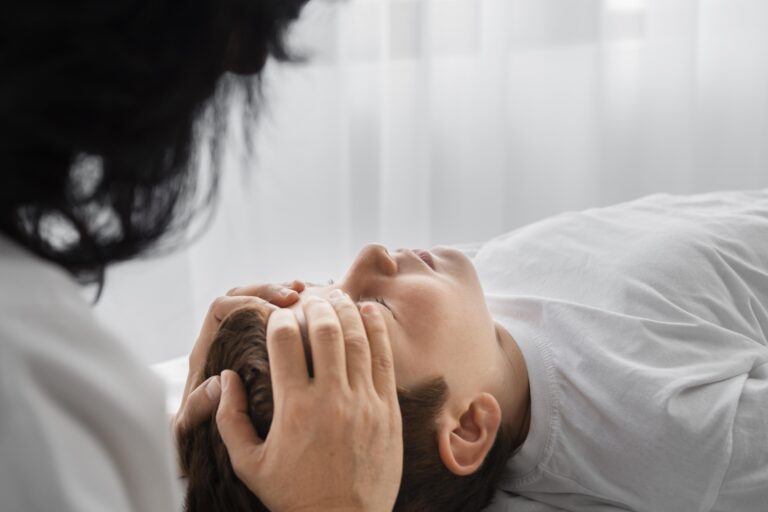Struggling with sleep? Your hormones might be to blame. Hormonal imbalances, especially as we age, can disrupt sleep patterns, leaving you tired and unrefreshed. Functional medicine offers a targeted approach to address these issues by focusing on the root causes. Here’s what you need to know:
- Key hormones affecting sleep: Cortisol (stress), melatonin (sleep-wake cycle), estrogen, progesterone, and testosterone all play vital roles in maintaining quality sleep.
- Common disruptions: Menopause, aging, and stress can cause insomnia, night sweats, fragmented sleep, and even sleep apnea.
- Functional medicine approach: Advanced hormone testing, personalized treatment plans, and natural therapies like bioidentical hormone replacement therapy (BHRT), dietary changes, stress management, and IV nutrient therapy can help restore balance and improve sleep.
Functional medicine prioritizes understanding your unique hormonal profile to create solutions that improve sleep and overall well-being. For those over 40, addressing these changes can be life-changing.
Hormones and Sleep: How hormone imbalance affects sleep/ Get good quality sleep again!
How Hormone Changes Disrupt Sleep
As we age, our bodies undergo hormonal shifts that can significantly interfere with sleep quality. These changes, though gradual, often make it harder to achieve the deep, restful sleep that is essential for overall well-being.
Hormone Shifts During Aging
For women, menopause brings a noticeable drop in estrogen and progesterone levels. Estrogen helps regulate body temperature, so its decline often leads to hot flashes and night sweats – two common culprits behind disrupted sleep. Progesterone, on the other hand, has a calming effect on the body, promoting relaxation and deep sleep. As levels of this hormone decrease, the natural sedative effect it provides diminishes, making it harder to rest.
Men also experience hormonal changes as they age, particularly a gradual decline in testosterone. Starting around age 30, testosterone levels typically decrease by about 1-2% per year. Lower levels of this hormone are linked to increased anxiety and more frequent awakenings during the night.
Another key player is melatonin, the hormone responsible for regulating your sleep-wake cycle. As we get older, melatonin production declines, particularly the nighttime peak that helps signal the body it’s time to sleep. For individuals over 55 who struggle with sleep, melatonin levels are often significantly lower compared to those without sleep issues. This reduction disrupts the circadian rhythm, making it harder for the body to maintain consistent sleep patterns.
Signs of Hormone Imbalances
Certain symptoms can indicate that hormonal imbalances are affecting your sleep. Insomnia, characterized by difficulty falling or staying asleep, is a common sign. This might manifest as lying awake for hours with a restless mind, unable to relax enough to drift off.
Night sweats and hot flashes are another frequent issue, particularly for women experiencing estrogen fluctuations during menopause. These sudden temperature changes can wake you up abruptly, making it tough to settle back into a comfortable sleep.
Aging also tends to bring about disrupted sleep-wake cycles. You might feel tired earlier in the evening but then wake up in the early morning hours, unable to fall back asleep. This shift is partly due to a weaker circadian rhythm caused by declining melatonin levels. Additionally, hormonal imbalances can lead to mood changes, such as irritability or anxiety, as well as persistent fatigue and difficulty concentrating during the day.
Older adults also spend more time in lighter sleep stages (N1 and N2) and less time in deep sleep (N3), which is crucial for physical and mental restoration. Even if you get 7-8 hours of sleep, the lack of deep sleep can leave you feeling unrefreshed.
Stress Hormones and Sleep Problems
Stress hormones, particularly cortisol, also play a significant role in sleep disruptions. Normally, cortisol levels peak in the morning to help you wake up and gradually decline throughout the day, reaching their lowest point at night. However, chronic stress and aging can throw this pattern out of balance.
If cortisol levels remain high at night, your body stays on high alert, making it difficult to fall asleep. You might feel physically drained but mentally unable to unwind. Chronic stress can also suppress melatonin production, further compounding sleep problems. This combination of hormonal changes contributes to the fact that total sleep duration tends to decrease with age – by about 10 minutes per decade on average.
Addressing these hormonal factors is key to improving sleep quality. Rather than just managing symptoms, identifying and correcting the underlying imbalances offers a more effective path to better rest and overall health. By focusing on these root causes, it’s possible to develop targeted strategies for restoring healthy sleep patterns.
Sleep Problems Caused by Hormone Imbalances
Hormonal imbalances can lead to specific sleep disorders that significantly affect your quality of life. Recognizing these patterns can help determine if your sleep struggles are tied to hormonal shifts rather than other causes.
Insomnia and Poor Sleep Quality
Chronic insomnia is a frequent issue linked to hormonal changes. This isn’t your occasional sleepless night – it’s an ongoing challenge where you regularly find it hard to fall asleep, stay asleep, or avoid waking up too early without being able to drift back to sleep.
When hormones are the culprit, insomnia feels different from stress-induced sleeplessness. You might feel completely drained yet find your mind racing as you lie in bed. A drop in progesterone levels can reduce the body’s natural calming effects, while fluctuating estrogen might add nighttime discomfort, making restful sleep even harder to achieve.
Another common issue is sleep fragmentation – you may fall asleep initially but wake up multiple times throughout the night. This often coincides with hot flashes or sudden changes in body temperature. These interruptions prevent you from reaching the deeper stages of sleep, leaving you feeling groggy and unrefreshed, even after spending enough hours in bed.
For men, a decline in testosterone can manifest differently. Many report falling asleep without trouble but waking up between 2:00 and 4:00 AM, feeling restless or anxious. This pattern often aligns with natural cortisol fluctuations and can quickly become a frustrating cycle.
Hormonal changes also reduce the time spent in REM sleep and deep sleep stages, which are critical for memory, learning, and physical recovery. Even if you log enough hours in bed, the lack of restorative sleep can leave you feeling irritable, foggy, and physically drained.
Sleep Apnea and Hormone Problems
Obstructive sleep apnea often becomes more prevalent as hormone levels shift, largely due to changes in body composition. Declining levels of estrogen and testosterone can lead to increased abdominal weight and altered fat distribution.
Fat accumulation around the neck and throat is particularly problematic, as it can narrow the airway during sleep. This restriction leads to breathing interruptions – short periods where breathing stops entirely – followed by gasping or choking as the body struggles to resume normal airflow.
Beyond weight changes, lower hormone levels can weaken the muscles around the airway. Estrogen and testosterone play a role in maintaining muscle tone, so their decline can cause the soft tissues in the throat to relax more during sleep, increasing the risk of airway collapse and worsening sleep apnea symptoms.
Postmenopausal women face a heightened risk. Before menopause, estrogen provides some protection against sleep apnea, but as estrogen levels drop, this protection fades. Combined with weight gain, muscle tone loss, and disrupted sleep patterns, these changes create a perfect storm for breathing problems during sleep.
Sleep apnea also disrupts hormone production. The frequent awakenings and oxygen drops caused by apnea can interfere with the release of growth hormone, which typically occurs during deep sleep. This disruption can further complicate the body’s ability to regulate hormones.
Disrupted Sleep-Wake Cycles
Hormonal imbalances can also throw off your circadian rhythm, the internal clock that regulates sleep and wake cycles. Hormones like melatonin and cortisol play key roles in signaling when it’s time to sleep and wake, and imbalances in these hormones can lead to circadian rhythm disorders.
One common issue is advanced sleep phase syndrome, where your sleep schedule shifts earlier. You might find yourself ready for bed by 7:00 or 8:00 PM and waking up at 3:00 or 4:00 AM, unable to fall back asleep. This happens when melatonin production starts earlier in the evening and fades too soon in the morning.
On the flip side, delayed sleep phase syndrome can occur, where you can’t fall asleep until late at night and then struggle to wake up at a reasonable hour. This often stems from flattened cortisol rhythms, where cortisol levels remain steady instead of peaking in the morning and tapering off throughout the day.
Irregular schedules – from shift work, frequent travel, or inconsistent bedtimes – can worsen these problems. When hormonal signals are already off balance, the body becomes less adaptable to changes, making it harder to reset your internal clock.
Temperature regulation also plays a role. Estrogen fluctuations can cause sudden spikes in core body temperature, interfering with the natural cooling process that signals bedtime. These mixed signals can confuse your body about whether it’s time to sleep or stay awake.
Even with good sleep hygiene – like sticking to a consistent bedtime or avoiding screens before bed – these disruptions can persist if the underlying hormonal issues aren’t addressed. Restoring hormonal balance is often key to improving sleep-wake cycles and achieving more restful, uninterrupted sleep.
When hormone levels are brought back into balance, sleep quality tends to improve across the board. Falling asleep becomes easier, staying asleep feels more natural, and you wake up feeling genuinely refreshed. Each improvement in sleep can have a ripple effect, helping other issues resolve as well.
sbb-itb-d9e542d
Functional Medicine Solutions for Sleep and Hormone Balance
Instead of simply masking symptoms, functional medicine takes a deeper dive to address the root causes of health issues. When it comes to sleep problems, this approach treats the body as a connected system rather than isolating symptoms. Hormonal imbalances, for example, can ripple through various aspects of health – impacting gut function, metabolism, mood, and overall well-being. Functional medicine practitioners aim to restore balance naturally by understanding and addressing these intricate connections.
Complete Hormone Testing
Effective treatment begins with thorough testing. Functional medicine practitioners rely on advanced diagnostic tools to map out hormone patterns and uncover the triggers behind sleep disturbances.
For women navigating perimenopause or menopause, hormone testing plays a critical role. Levels of estrogen, progesterone, cortisol, and testosterone are measured to identify imbalances and guide potential hormone replacement therapies.
The DUTCH Plus test, for instance, provides a detailed 24-hour adrenal profile, shedding light on cortisol fluctuations that are key to maintaining a healthy circadian rhythm. Disruptions in the hypothalamic-pituitary-adrenal (HPA) axis can directly contribute to sleep issues.
Neurotransmitter evaluations also come into play, examining chemicals like serotonin and GABA that influence sleep. These neurotransmitters often shift during hormonal changes, such as those experienced in perimenopause or menopause. Since serotonin is a precursor to melatonin, an imbalance can significantly affect the ability to fall and stay asleep.
A complete thyroid panel is another essential step. Testing TSH, T3, T4, reverse T3, and thyroid antibodies helps identify conditions like hypothyroidism or hyperthyroidism, which can exacerbate sleep problems and menopause symptoms.
Gut health is another area of focus. Testing the gut microbiome reveals how bacterial diversity – or a lack thereof – affects both sleep quality and estrogen metabolism. Gut inflammation or imbalances can worsen hormonal issues and disrupt sleep.
Additional evaluations might include sleep apnea screening, especially since menopausal women are 2–3 times more likely to develop this condition, and continuous glucose monitoring to refine nutritional strategies. Poor sleep often correlates with insulin resistance, making this an important consideration.
With a clear understanding of these imbalances, practitioners can create a highly personalized treatment plan.
Custom Treatment Plans
Once the testing phase is complete, functional medicine practitioners craft treatment plans tailored to your unique needs. These plans are designed to align with your biochemistry, genetics, lifestyle, and stress levels.
Nutritional adjustments are often a cornerstone of these plans. Addressing deficiencies in key nutrients – like B vitamins, vitamin D, and essential minerals – can significantly improve hormone production and sleep quality.
Stress management is another critical element. Chronic stress disrupts both hormone levels and sleep patterns, so techniques like meditation, breathing exercises, or lifestyle changes are introduced to help regulate cortisol naturally.
Supplementation is carefully selected based on test results, providing targeted support for hormone production and metabolism. Nutrients and botanicals are chosen to work in harmony with your body’s needs.
Lifestyle modifications are also key. These adjustments might include creating an optimal sleep environment, fine-tuning meal timing to support hormonal health, and incorporating physical activity that promotes balance without adding stress to the system.
This interconnected approach recognizes that improving one area – like gut health – can have a cascading effect, enhancing hormone metabolism, boosting sleep quality, and reducing stress. The result is a positive cycle of healing that addresses the root causes of your symptoms.
Kinnection Clinic‘s Complete Approach

At Kinnection Clinic, these principles are taken a step further with an integrated approach that combines functional medicine with additional therapies. This comprehensive strategy addresses multiple facets of your health simultaneously, promoting more complete and lasting improvements.
Functional medicine consultations at the clinic include advanced diagnostic testing along with an in-depth review of your health history. Practitioners examine current symptoms, past medical issues, family health patterns, lifestyle factors, and environmental exposures to uncover all potential contributors to your hormone imbalances.
The clinic also incorporates Gonstead chiropractic care, which focuses on spinal alignment. Proper alignment supports the nervous system, which plays a vital role in hormone regulation and sleep quality. By addressing misalignments, the body’s natural hormone production can function more effectively.
For those with hormone deficiencies, bioidentical hormone replacement therapy is offered. These hormones are molecularly identical to those produced by your body, providing a more natural way to restore balance.
IV therapy is another tool in the clinic’s arsenal. By delivering nutrients directly into the bloodstream, IV therapy bypasses digestive barriers, ensuring maximum absorption. These infusions can boost energy, reduce inflammation, and provide essential building blocks for hormone production.
Regenerative medicine options, such as PRP and peptide therapies, support the body’s natural healing and vitality, further enhancing overall wellness.
Proven Functional Medicine Treatments
When hormonal imbalances disrupt sleep, functional medicine takes a different approach. Instead of just masking symptoms, it focuses on addressing the underlying causes. By restoring balance in your body, these treatments can improve sleep quality and help you feel more rested.
Bioidentical Hormone Replacement Therapy (BHRT)
For sleep issues linked to hormonal imbalances, Bioidentical Hormone Replacement Therapy (BHRT) is a powerful solution. Unlike synthetic hormones, bioidentical hormones are designed to match your body’s natural hormones exactly, making them easier for your system to process.
This therapy works by rebalancing key hormones like cortisol, melatonin, estrogen, and progesterone – hormones that play a critical role in regulating your sleep. When these hormones are in harmony, your natural sleep-wake cycle can function properly, allowing you to achieve the deep, restorative sleep your body needs.
For women navigating perimenopause or menopause, BHRT is especially effective. During this phase, declining estrogen levels often lead to an overproduction of cortisol, which can cause daytime fatigue, anxiety, and restless nights. BHRT helps restore estrogen levels, signaling the body to lower cortisol production and promoting more restful sleep.
Additionally, BHRT supports your body’s natural melatonin production. Instead of relying solely on melatonin supplements, this therapy addresses the hormonal imbalances that disrupt melatonin synthesis, offering a more sustainable way to tackle persistent sleep problems.
It’s worth noting that 1 to 2.5 million women in the U.S. over age 40 currently use compounded bioidentical hormones. Many report significant improvements in sleep once their hormone levels are properly balanced.
Diet and Lifestyle Changes
Hormonal balance and sleep quality don’t rely solely on therapy – diet and lifestyle play a huge role too. Adjusting what and how you eat can support both hormone production and better sleep.
- Anti-inflammatory diets: These diets focus on whole foods like omega-3-rich fish, antioxidant-packed fruits and vegetables, and fiber. By reducing inflammation, they help improve hormone function and stabilize sleep patterns. Processed foods and excess sugar, on the other hand, can throw your hormones off balance.
- Phytoestrogen-rich foods: Flaxseeds, soy, lentils, and chickpeas contain plant compounds that naturally support estrogen levels. Including these in your diet can complement other treatments.
- Meal timing: Eating your largest meals earlier in the day aligns with your natural cortisol rhythms. Avoiding heavy meals close to bedtime prevents blood sugar spikes that can disrupt sleep. Most experts recommend finishing your last meal at least three hours before you go to bed.
Stress management is another key piece of the puzzle. Practices like meditation and deep breathing can help regulate the hypothalamic-pituitary-adrenal (HPA) axis, which controls stress hormones and sleep cycles. Even just 10 to 15 minutes of mindfulness each day can make a noticeable difference in cortisol levels and sleep quality.
Exercise also helps balance hormones, but timing matters. Moderate workouts earlier in the day can improve circadian rhythms and lower cortisol levels. However, intense exercise too close to bedtime can have the opposite effect, keeping you awake when your body should be winding down.
Finally, creating the right sleep environment is essential. Keep your bedroom between 65-68°F, establish a consistent bedtime routine, and limit blue light exposure in the evening to support your body’s natural sleep-wake cycle.
Advanced Treatment Options
When diet and lifestyle changes aren’t enough, advanced treatments can provide additional support.
- IV nutrient therapy: This delivers vitamins and minerals directly into your bloodstream for quick absorption. Magnesium IV therapy, for example, can help with insomnia by supporting melatonin production and calming the nervous system. B-vitamin complexes given through IV therapy also help manage stress and support neurotransmitter production, including serotonin, which plays a role in sleep.
- Targeted supplementation: Functional medicine practitioners often recommend specific supplements based on individual needs. Adaptogenic herbs like ashwagandha can help regulate cortisol, while amino acids may support neurotransmitter balance.
- Chiropractic care: Techniques like the Gonstead method focus on spinal alignment, which can improve nerve signaling related to hormone production and sleep regulation.
- Peptide therapies: These treatments work at the cellular level to enhance growth hormone production, improve deep sleep phases, and aid recovery.
At Kinnection Clinic, these advanced options are combined with therapies like BHRT, IV nutrition, and Gonstead chiropractic care for a comprehensive, tailored approach. By addressing multiple factors simultaneously, this integrated strategy often delivers faster and more lasting results than focusing on a single treatment.
Conclusion: Better Sleep Through Functional Medicine
The link between hormone health and sleep is undeniable. Hormones like melatonin, cortisol, estrogen, and progesterone play a key role in maintaining restful sleep. When these hormones are out of balance, sleep quality suffers, and the risk of chronic health issues rises. It’s no wonder that nearly 70 million Americans face sleep disorders today[11,12].
Functional medicine steps in with solutions that go beyond simply masking symptoms. Instead, it focuses on identifying and addressing the root causes of these imbalances[9,10]. For example, research highlights that diets rich in whole grains, fruits, and vegetables can reduce insomnia rates. Additionally, stress management techniques have been shown to improve sleep for individuals dealing with anxiety or depression-related issues[9,10].
What sets functional medicine apart is its personalized approach. Each person’s hormonal profile, health history, and daily habits are different, so one-size-fits-all treatments rarely work. By conducting in-depth hormone testing and thorough health evaluations, practitioners can craft customized treatment plans that target specific imbalances and triggers.
This tailored care is especially important for women experiencing life transitions like perimenopause or menopause. Hormonal fluctuations during these stages can wreak havoc on sleep, with up to 61% of postmenopausal women reporting sleep disturbances linked to changes in estrogen and progesterone levels.
At Kinnection Clinic, this personalized approach combines advanced diagnostics with wellness strategies like hormone replacement therapy, IV therapy, and performance coaching. These methods not only address hormonal and nutritional imbalances but also promote better sleep and overall vitality.
Improving sleep with functional medicine means focusing on sustainable, root-cause solutions. It’s about understanding your body’s specific needs, tackling the underlying issues disrupting your rest, and making meaningful changes that support both immediate and long-term health. When your hormones are in balance, you’re not just sleeping better – you’re setting the foundation for a healthier, more vibrant future.
FAQs
How do hormonal changes during menopause and aging disrupt sleep?
Hormonal changes during menopause and aging can wreak havoc on sleep patterns. One key factor is the drop in progesterone, a hormone known for its calming and sleep-promoting effects. With less of it, falling asleep and staying asleep can become a real challenge. On top of that, fluctuations in cortisol, often called the stress hormone, can lead to restless nights and frequent wake-ups.
These hormonal shifts often result in sleep problems such as insomnia, disrupted sleep, and an overall decline in sleep quality. Many women start experiencing these issues during perimenopause, and for some, the symptoms continue into postmenopause. Tackling the underlying hormonal imbalances can make a big difference in improving sleep and enhancing overall well-being.
What tests does functional medicine use to identify hormonal imbalances that affect sleep?
Functional medicine frequently incorporates detailed hormone panels to assess levels of hormones like estrogen, progesterone, and testosterone. Adrenal function tests are another key tool, as they measure cortisol levels, which play a significant role in regulating sleep cycles. Additionally, melatonin evaluations – done through blood or urine – can reveal whether your body is producing enough of this hormone to support healthy sleep patterns. These tests offer valuable insights into how hormonal imbalances might be affecting your sleep and help shape tailored treatment approaches.
Can lifestyle changes improve sleep problems caused by hormonal imbalances, or is medical treatment necessary?
Lifestyle adjustments, like prioritizing good sleep habits, managing stress effectively, eating a nutritious diet, and staying active, can greatly help with sleep problems tied to hormonal imbalances. These practices work to support the body’s natural hormone regulation and can lead to noticeable improvements for many individuals.
That said, in cases where the imbalance is more severe or sleep issues continue despite these efforts, medical treatments such as hormone replacement therapy or other options might be necessary. Often, the best approach combines healthy lifestyle changes with targeted medical care to address sleep disturbances related to hormonal shifts effectively.



